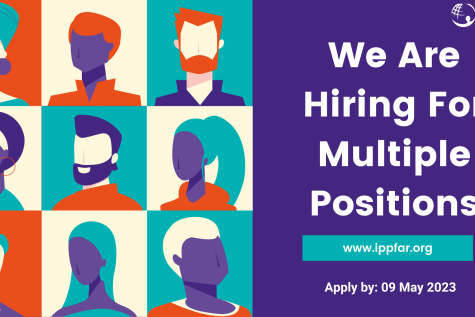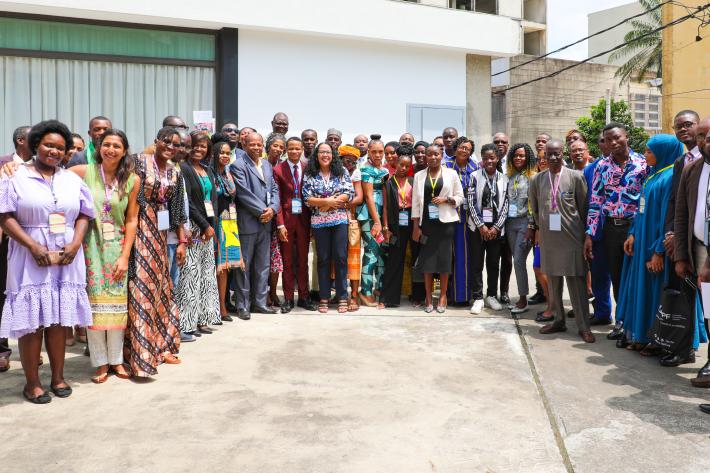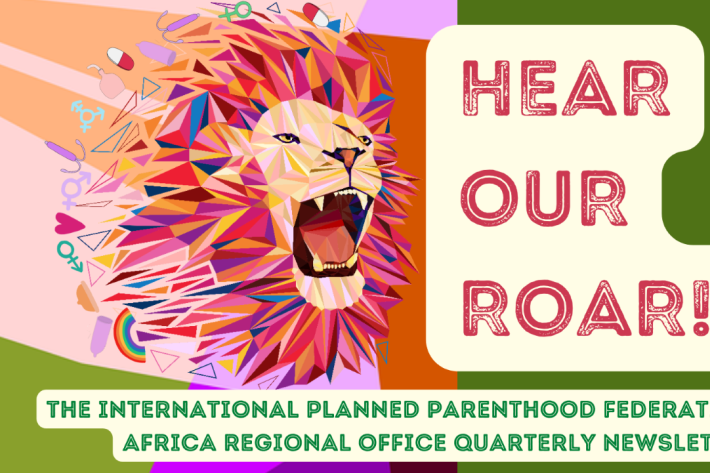
Spotlight
A selection of news from across the Federation

Africa
IPPF Africa Region is seeking talented individuals to support its work
In alignment with its strategy, the IPPF Africa Regional Office is hiring for multiple positions based in Kenya and Côte d'Ivoire.
Filter our news by:


| 27 July 2017
Access to safe abortion care and services promoted by the newly inaugurated SADC Women’s Parliament
The Southern Africa Development Community (SADC) Inaugural Women’s Parliament has adopted The Access to Safe Abortion motion which was tabled by Honourable Thuli Dladla Member of Parliament of Swaziland. The adoption comes after a one-day meeting held on the 5th of July 2017 at the Eden Bleu Hotel, Mahe Island, Seychelles which was attended by Female Parliamentarians from the SADC States, Government Officials as well as representatives from IPPF Africa Region and other Civil Society Organisations. While moving the motion, Honourable Thuli Dladla told the House that the Commission had observed the general absence of Policy Standards and Guidelines on Safe Abortion in the SADC Region and further indicated that South Africa, Mozambique and Zambia had enacted progressive laws on access to safe abortion while Seychelles allows for abortion up to 12 weeks of pregnancy. However, there are still limited grounds for abortion in other Southern Africa States. The motion recommends that the Forum (SADC-PF) must, among others, spearhead: the development of a Model Law on Access to Safe Abortion in the SADC Region; Member Parliaments must convene in-country consultations with young women and girls on Access to Safe Abortion; The Forum should urge all SADC Member Parliaments to decriminalise laws on abortion; Members of Parliament must promote peer learning and exchange visits to promote sharing of knowledge on access to reproductive health; A SADC Regional Consultative meeting for young women on access to safe abortion must be convened; and Member Parliaments must ensure that laws governing the age of consent must not restrict access to sexual and reproductive health services. The motion was seconded by Hon. Patricia Kainga, Member of Parliament, Malawi. Seconding the motion, Hon Kainga noted that the right to health requires the removal of all barriers interfering with access to health services, education and information, including sexual and reproductive health. Hon Kainga further stated that: “We must urgently give effect to the Protocol of the African Charter on Human and Peoples’ Rights on the Rights of Women in Africa (Maputo Protocol) which explicitly recognizes that the right to health includes access to safe and legal abortion, at a minimum, in certain circumstances.’’

| 08 May 2017
Youth Volunteerism: Lessons from IPPF’s South Asia Region by Priya Kath
Ms. Priya Kath, a vibrant Youth Action Movement (YAM) advocate and representative from IPPF’s South Asia Region (IPPF-SARO) recently attended the IPPF Africa Region Volunteerism and Governance workshop from 27 - 29 March 2017 in Nairobi, Kenya. The workshop was attended by volunteers and staff from English-speaking Member Associations (MAs) in the IPPF Africa Region, who included; MA Chairpersons, Youth Action Movement (YAM) representatives , Executive Directors (EDs) and MA Governance Focal Point Persons. Created in 2005, the Youth Action Movement (YAM) is the youth arm of IPPFAR volunteer’s body based within the Member Associations (MAs), which catalyzes youth participation. The YAM plays a key role in identifying priority areas and needs for young people to be fed into the MA plans as well as the regional plans. This process enhances consultation and involvement of the youth. The structure further enables young people to advocate and be recognized, and empower them to be equal partners in programmatic decision making and resource allocation at all levels. In her presentation to participants, which focused on youth volunteerism, recruitment, engagement and retention, as well as youth – adult transition in IPPF, Ms. Kath, highlighted the importance of volunteerism among young people in various development causes, more so those touching on the sexual reproductive health and rights of young people. “The experience gained from the various opportunities one is exposed to as a youth volunteer is invaluable. For example, they are able to attend various national and international health forums where their knowledge on SRHR is increased. As YAM volunteers, they are also able to network with other like-minded individuals and organizations. At a personal level, the IPPF experience has built my capacity as a youth SRHR advocate immensely,” she said. Ms. Kath also lauded the Federation for its enviable practice of including young people in its governance and leadership structures. “Youth are involved in decision-making levels at the Member Associations, and are also eligible to become SARYN members. Two representatives from each MA (20%) makes 18 SARYN members. Elected members are also able to represent youth at the top echelons of management; the Regional Executive Committee (EXCO) and Governing Council (GC).” Sharing her own experiences, Ms. Kath said she joined the movement as a youth volunteer eight years ago at the Family Planning Association of India (FPAI), where she then went on to be elected as a Youth Representative for IPPF’s South Asia Region (SARO). Ms. Kath currently serves as the alternate youth representative at the Governing Council. Being above 25 years, Ms. Kath has further been elected to a higher position, where she serves as an adult volunteer in the SARO Board. She encouraged young people from Africa to join the Youth Africa Movement in their local Member Associations, for purposes of gaining the wide range of benefits that come with this and also to continue contributing to the IPPF goals and objective in support of the marginalized and vulnerable in our society. Story by Maryanne W. Waweru, IPPF Africa Region. For more updates on the work of IPPF Africa Region, follow us on Facebook and Twitter
| 02 May 2017
IPPFAR Holds Volunteering and Governance Workshop in Abidjan
IPPF Africa Region Member Associations (MAs) from 15 French-speaking countries recently participated in a three-day Volunteering and Governance workshop in Abidjan, Ivory Coast. The meeting was held at the Association Ivoirienne pour le Bien-Etre Familial (AIBEF) offices in the capital city. In his opening speech, Adv. Kweku Brenu, the IPPFAR President urged the MA and Youth Action Movement (YAM) representatives to intensify their commitment to the spirit of volunteerism to the Federation, in a bid to advance development gains for the continent. Also in attendance was Mr. Lucien Kouakou, the Regional Director, IPPFAR, who acknowledged the invaluable role that IPPFAR volunteers continue play towards the success of the organization. Young people from the Youth Action Movement (YAM), led by the chair, Ms. Adama Dicko, also attended the meeting. The youth shared their experiences on their volunteer work; their successes, challenges and the benefits they have received as a result of their engagements. Information source: Joel Eklou, Communication and Resource Mobilization Manager, The Association Togolaise pour le Bien-Etre Familial (ATBEF) For more updates on our work, follow IPPF Africa Region on Facebook and Twitter
| 10 April 2017
Second Phase of Journalists Network Project Kicks off in Nairobi
10 April 2017, Nairobi, Kenya. From 2012 – 2015, IPPF Africa Region implemented a ‘Networks’ project that involved the close collaboration of African journalists and Civil Society Organizations (CSOs) that have a bias in reproductive health -working together in the promotion of Sexual Reproductive Health and Rights (SRHR) information and access to services. The project also focused on calls for strengthened commitment to reproductive health issues by Governments, Legislators and other key stakeholders, including calls for policy reviews and change. The project worked with a strong team of African journalists who were involved in developing accurate reports on various issues surrounding SRHR, including family planning and maternal health. These reports were key to influencing policy makers and other development actors through promoting discussions and highlighting areas of improvement. The journalists worked under the umbrella of the IPPFAR SRHR Journalists Network Group. Some of the activities of the first phase of the project included: training of journalists in various aspects of SRHR, awarding of journalists’ grants to facilitate their production of quality and in-depth SRHR stories, facilitating their attendance to various national, regional and international SRHR events, as well as two media awards that recognized exemplary SRHR reporting among African journalists. Following the success of the Networks project, and with the aim of enhancing the positive outcomes achieved in the first phase, the David and Lucille Packard Foundation has renewed it's funding to IPPFAR. The second phase of the project will be implemented in collaboration with the African Union Commission (AUC), and is themed around the advancement of Adolescent and Youth Sexual and Reproductive Health and Rights (AYSRHR). The three-year project will adopt a comprehensive and coordinated approach to have the Journalists' Network and the partners’ coordination strategies mutually supporting each other and focusing on Comprehensive Sexuality Education (CSE) and youth-friendly services. The project has kicked off today, with a three-day regional induction meeting in Nairobi, Kenya, that has brought together over 30 members of the IPPF Africa Region journalists network, Communication and Advocacy Officers from Member Associations, as well as Youth Action Movement members. Speaking during the opening ceremony, Mr. Lucien Kouakou, IPPF Africa Regional Director, acknowledged the great role that African journalists continue to play in regards to the achievement of Africa’s development goals. “There is no doubt that journalists are key influencers in the realization of positive change in Africa, as they are instrumental in exploring new topics and fostering public debate on important sexual and reproductive health issues. Through their in-depth and quality reports, journalists have the unmatched ability to exert pressure on governments to fulfil their mandates –especially those touching on public health. IPPF Africa Region will continue to work with African journalists in fostering the continent’s development, and achieving reproductive health gains in the continent,” he said. For more updates on our work, follow IPPF Africa Region on Facebook and Twitter
| 08 March 2017
IPPF Africa Regional Director's Message on International Women's Day 2017
Wednesday 8 March, 2017 By Mr. Lucien Kouakou, IPPF Africa Region Director Today, IPPF Africa Region joins the world in marking the International Women’s Day (IWD); a day set aside to celebrate the social, economic, political and cultural achievements of women. For many years, the role of women was confined to the periphery, where they were hardly recognized for their value and important contribution to society’s development. But times are changing, and women today are not only being acknowledged for their worth, but are also being encouraged to carve out their own identity as individuals; as women. This process of recognition has been gradual and has spanned over decades. Despite the gradual spate in acknowledging the contribution of women, the time has come for us to celebrate the achievements that have been made, and look forward to even more accomplishments. IPPFAR has been instrumental in this process, and we pride ourselves in being an organization that has always put women at the heart of our programmes. Our programmes are designed in a way that ensures that our mothers, daughters, sisters, aunts and cousins have their reproductive health and rights concerns addressed in a timely, effective, affordable and sustained manner. Further, IPPFAR’s commitment to gender equality and respect of sexual rights is affirmed in the 2016 - 2022 Strategic Framework as an absolute principle that guides its actions. The Federation is driven by progressive statutory documents and supportive policies that guarantee a fair working environment and decision-making powers both for women and men. IPPF Africa Region continually endeavors to support Africa’s women in their quest to realize their full potential. We are deeply committed to addressing the various challenges and barriers they face in their journey to this achievement. Through various advocacy efforts, IPPFAR and its Member Associations are centrally involved in creating and championing supportive policy environments that are aimed at reducing the various health, social, economic, political and other inequalities that affect women and girls. We have been involved in several policy consultative processes in many African countries with respect to the improvement of women’s rights. As we honor all women today, I urge you all to seize all available opportunities that empower women in all spheres of their lives. Take it upon yourself to seek strategic partnerships with institutions that will support this quest. It is also our responsibility to encourage women to adapt to technological changes that are necessary for them to survive and thrive in today’s environment. I further encourage all of those in the IPPFAR network to increase their positive actions towards women. It essential and imperative to acknowledge and recognize the fact that women are fundamental to the achievement of Africa’s developmental goals as set out in the AU Agenda 2063. Let us continue to engage in initiatives that are geared towards the advancement of Africa’s women, and let us be #BeBoldForChange by standing by women today, promoting their rights, speaking up for them and encouraging them to raise their own voices. I wish you all a Happy International Women’s Day.
| 13 February 2017
IPPF European Network Regional Director visits Family Health Options Kenya (FHOK)
The IPPF European Network Regional Director Ms. Caroline Hickson has today paid a courtesy visit to the Executive Director of Family Health Options Kenya (FHOK), Mr. Edward Marienga. FHOK is IPPF’s Member Association in Kenya. Ms. Hickson is on a working visit to the IPPF Africa Regional Office located in Nairobi, Kenya. During the meeting, Mr. Marienga oriented Ms. Hickson on FHOK’s work in the country, whose core focus is the provision of quality sexual reproductive health and services to millions of men, women and young people. FHOK, a local Non-Governmental Organization has been a leading service provider of sexual and reproductive health services in the country for over five decades. With a strong grassroots network, FHOK is present in 14 Counties (out of 47), through its Family Care Medical Centers. Through innovative delivery programming and capacity building, FHOK particularly focuses on young people, marginalized groups, underserved and inaccessible populations in the country. FHOK has a pricing policy that offers affordable, quality and easily accessible services to all. The meeting between Ms. Hickson and Mr. Marienga also acted as an experience-sharing forum between the two parties, where both discussed best SRHR implementation practices. FHOK also showcased its successful business models including its Learning Center and other income-generation ventures, which have greatly contributed to the success and sustainability of the organization over the years. “Our work has also been greatly enhanced by the strong partnerships that we have formed with different stakeholders, chief among them the Government of Kenya. We recognize the invaluable support of the Government in the achievement of our goals, and regularly consult with them on various issues. We also collaborate with them in programme activities, such as cervical cancer screening, testing and treatment, as well as various HIV/AIDS activities –including at the grassroots level. FHOK works with other non-governmental organizations, community-based organizations, faith-based organizations, youth networks and other groups towards the realization of it's goals,” Mr. Marienga added. Other issues that were discussed included effective advocacy strategies in the push for supportive SRHR policies and legislations at local, national and regional levels. Ms. Hickson commended FHOK for its work, saying that there was plenty to learn from the organization, and which can also be emulated by other Member Associations –including those in Europe. IPPF EN includes 39 Member Associations and collaborating partners in as many countries throughout Europe and Central Asia. The Region reaches from Iceland to Kyrgyzstan and from Russia to Israel, from some of the richest countries in the world to some of the poorest, from donor countries to recipient countries, from long-standing democracies to countries still struggling to find their way. Learn more about IPPFEN here. Learn more about FHOK here.
Pagination
- First page
- Previous page
- …
- 10
- 11
- 12
- …
- Next page
- Last page











